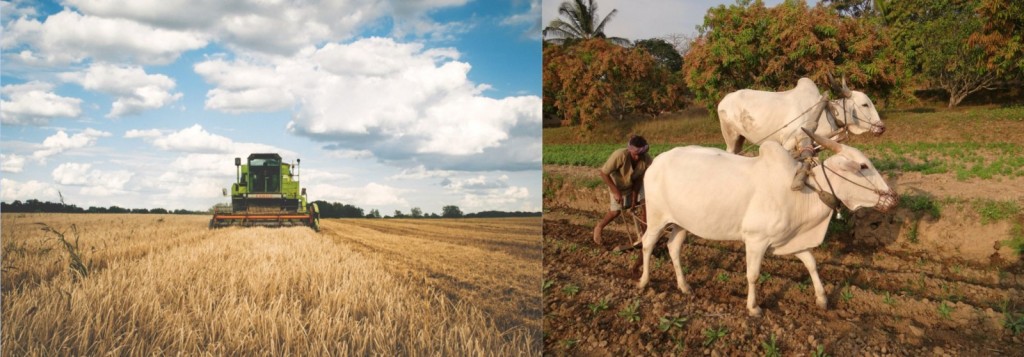
Love it or hate it, agribusiness is the main player in the realm of food and fiber production. The days of the supposed idyllic rural farm life are largely gone (albeit their is a growing interest in new peasantry), having been replaced by super-sized farms run with the increasingly specialized technology. There is nothing inherently wrong with technological advancement. In fact, it is key to the so-called evolution of the human race. Still every choice is a trade off and every opportunity comes at a cost. As such, there are a range advantages and disadvantages of agribusiness.
For example, agribusiness inherently requires that agriculture be examined at a systems level – rather than explicitly focusing on on-farm activities. This highlights the various connections between the different stakeholders and demands a minimum level of cooperation and the need for a systems approach to problem-solving. Unfortunately, the social and environmental elements of agricultural production are often overlooked in favor of profit maximizing methods.
In any case, entry into the agricultural system is difficult. Land is expensive. Resources are expensive. Capital is expensive. Infrastructure has evolved to cater to the needs of industrialized producers. Corporations capable of vertically integrating do. After all, they want to keep the competition out.
As these corporations grow and monopolize market shares, they gain a disproportionate amount of influence on public policy and industry standards. They continue to receive the lion’s share of subsidies from the government while advocating for the dismantling of public programs that would benefit the wider community. Education and research often favor industrialized approaches to production and larger entities have the financial capacity to conduct proprietary research that they are not obliged to share with or work towards objectives that benefit the general population – as would be the case with, for example, agricultural extension.
At the same time, large corporations do produce the vast majority of goods to ‘normal’ retail locations, e.g. supermarkets, and are responsible for feeding the majority of the country. Due to their massive size, the kings and queens of agribusiness enjoy the benefits of economies of scale so they can keep prices low. They can offer the $1.99/lb. pork chops for which the world hungers (the ethics of animal welfare is another story). Those are the same (metaphorical) pork chops that put many small-scale farmers out of business as it’s quite challenging to compete with the cost and convenience of conventionally produced food.
The dangers of being dependent on a few producers is undeniable as there is arguably a too big to fail scenario that keeps the world dependent on existing infrastructure. Such a dependency often leads to a lack of lack of respect or appreciation for alternative approaches that do not fit into the ‘gold standard’, i.e. industrialized approach to production.
In summary, the advantages and disadvantages of agribusiness can be understood as:

see also:
- what is agribusiness? how did agribusiness evolve?
- the origins and history of agribusiness
- how does agribusiness work? what are the different parts of agribusiness?
sources:
- Goldsmith, A. (1985). The private sector and rural development: Can agribusiness help the small farmer?. World development, 13(10-11), 1125-1138.
- Magdoff, F., Foster, J. B., & Buttel, F. H. (Eds.). (2000). Hungry for profit: The agribusiness threat to farmers, food, and the environment. NYU Press.
- Stanton, J. V. (2000). The role of agribusiness in development: replacing the diminished role of the government in raising rural incomes. Journal of Agribusiness, 18(345-2016-15221), 173-187.
- Wilkinson, J. (2009). The globalization of agribusiness and developing world food systems. Monthly Review, 61(4), 38.
image credit

2 Replies to “the advantages and disadvantages of agribusiness”
Comments are closed.